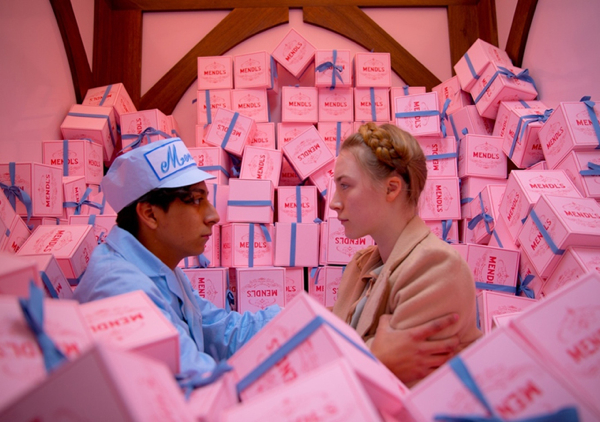Movie review by Greg Carlson
Wes Anderson’s remarkable, singular vision continues to flower in “The Grand Budapest Hotel,” the auteur’s tantalizing, beguiling eighth feature. Adorned with the director’s immediately recognizable hallmarks – summarized effectively by an “Onion” gag headlined “Wes Anderson Reteams with Favorite Objects for ‘Grand Budapest Hotel’” – the film is among Anderson’s most satisfying and rewarding experiences. Set mostly in 1932 in a pop-up storybook fantasyland called the Republic of Zubrowka, a fading, old world relic of the Austro-Hungarian Empire on the eve of war, collapse, and ruin, “The Grand Budapest Hotel” concludes with a title indicating Anderson’s indebtedness to the suicidal Viennese writer Stefan Zweig, whose memoir “The World of Yesterday” might very well be the movie’s subtitle, if not an apt description of Anderson’s overarching career raison d’etre.
Recounted via nested flashbacks that come to rest on the almost square aspect ratio evocative of the Academy standard of Hollywood’s golden age, “The Grand Budapest Hotel” employs an army of appealing performers, several of them Anderson regulars, in support of a madcap murder mystery/art theft caper that threatens to swallow up the sexually omnivorous gigolo Gustave H. (Ralph Fiennes), the fastidious steward of the title resort who uses his position to seduce and comfort the aged clientele. When Gustave is bequeathed the fictional Johannes Van Hoytl the Younger’s “Boy with Apple,” a priceless Renaissance portrait containing several juicy symbols paralleling Gustave’s epicurean decadence, Anderson operationalizes the painting as the film’s MacGuffin.
Channeling several of Edward Everett Horton’s fey, well-dressed gentlemen of indeterminate proclivity displayed to dizzying effect in the films of Ernst Lubitsch and alongside Astaire and Rogers, Fiennes captivates and charms, through and through. Gustave’s half genuine, half ersatz urbanity and refinement, scented by the pungent aroma of L’Air de Panache, the astringent cologne he liberally applies, is betrayed by the man’s equally luxuriant deployment of coarse, hilarious profanity. Like Gene Hackman as Royal Tenenbaum, Fiennes has located one of his finest career performances in the unlikeliest of places.
Gustave’s assistant and partner in scandal is lobby boy in training Zero Moustafa (Tony Revolori), the movie’s central observer and audience surrogate. A quick study under Gustave’s precise tutelage, Zero falls for pastry chef Agatha (Saoirse Ronan), whose pastel hued Courtesan au Chocolat confections arrive in the collapsible pink packages of Mendl’s bakery, their ribbon-secured sides inspiring the kind of delectation that accompanies the sight of a Tiffany Blue Box. Ronan’s talent commands attention, and the alluring Agatha, with her prominent facial birthmark, is the movie’s inscrutable Mona Lisa.
Unquestionably, the central relationship of “The Grand Budapest Hotel” belongs to Gustave and Zero, but I wanted to see more of Agatha, or for that matter, any female with something of significance to contribute. Of the seventeen stars who adorn the movie’s lovely one sheet, only three are women. Of those three, Lea Seydoux’s chambermaid Clotilde appears fleetingly and Tilda Swinton’s mummified dowager takes a rather abrupt powder. Anderson is no misogynist, but the male-centric focus of nearly every film in his oeuvre indicates an ongoing delinquency.
Anderson furnishes “The Grand Budapest Hotel” with a carnival of brilliantly executed set pieces. Scale models of funicular railway cabins elevate guests to the opulent spa. A wild, awe-inspiring ski chase is executed in mischievous miniature. A hilarious interlude behind bars is capped by one of cinema’s most satisfying and hysterical prison breaks. A droll series of single shots reveals a secret society of hotel concierges, and all the while Anderson’s impeccable sense of timing and cinematic choreography marries high and low comedy in harmonious union.
Underneath the frantic shenanigans, however, Anderson sustains his longstanding warmth and affection for these outré eccentrics, and “The Grand Budapest Hotel” never misses a step in its combination of the comic and the melancholic. With a light touch that has invited multiple comparisons to Lubitsch, Anderson incorporates enough political subtext to acknowledge the rise of Nazism and anti-Semitism that would envelop Europe and initiate the Holocaust. Like so many of his films, “The Grand Budapest Hotel” can conjure smiles and tears at a single image or line of dialogue.
Michael Chabon, in his introduction to Matt Zoller Seitz’s indispensable “The Wes Anderson Collection” (which will soon require an updated edition), writes, “With each of his films, Anderson’s total command of detail – both the physical detail of his sets and costumes, and the emotional detail of the uniformly beautiful performances he elicits from his actors – has enabled him to increase the persuasiveness of his own family Zemblas, without sacrificing any of the paradoxical emotional power that distance affords.” The book was published prior to the release of Anderson’s newest movie, but Chabon’s thoughts, linking the filmmaker to Vladimir Nabokov and Joseph Cornell, could be readily applied to “The Grand Budapest Hotel” and, one presumes and hopes, many more stories to come.
